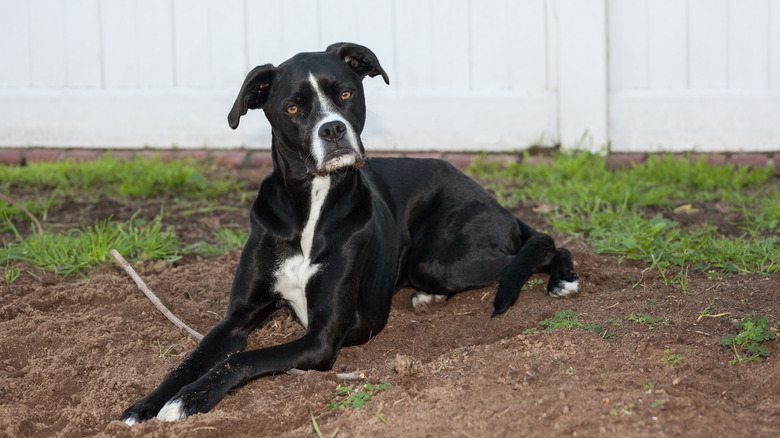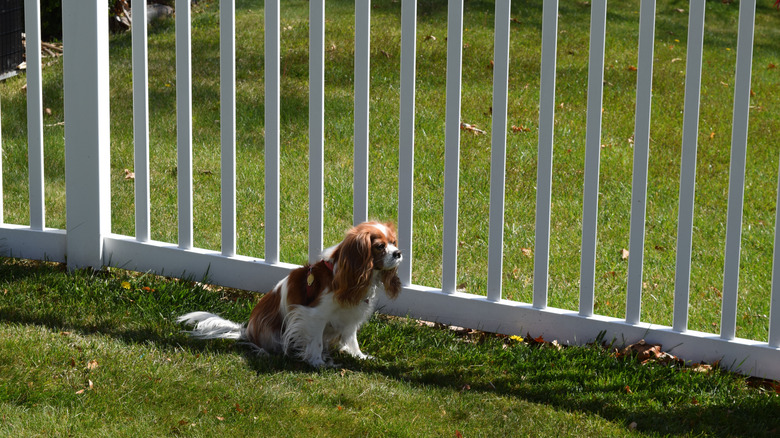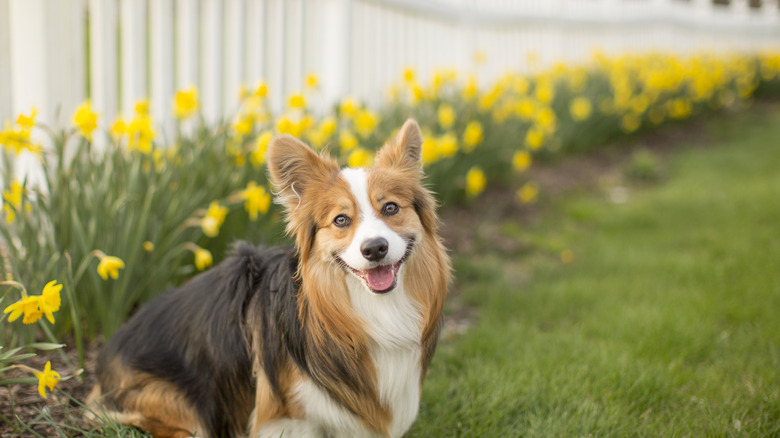Why You Should Consider A Vinyl Fence For Your Yard If You Have Dogs
We may receive a commission on purchases made from links.
If you have a dog, you may be considering getting your yard fenced in. There is no shortage of great reasons to call a contractor if you are "on the fence" about getting it done. Having a fence provides a secure place for your dog to run around, free from the dangers of busy roads and unpleasant interactions with other animals and people. This reduces your dog's risk of painful and expensive injuries. If your dog is a breed that enjoys running for miles or has poor recall, a fence can also help keep them from running away and getting lost. If you're looking into different types of fencing materials, you might be overwhelmed with the number of options. Chain link, metal, wooden, and vinyl fences are all popular choices for dog owners. Vinyl fences, however, have advantages over the others when it comes to creating a dog-proof fence.
Vinyl's clear selling point is its aesthetic appeal. There are other compelling reasons, however, to opt for a vinyl fence for your dog. Vinyl fences are durable, low-maintenance, and customizable to your dog's needs. It's essential to note that vinyl fencing can be expensive, particularly if you have a large yard. Since the material you choose for your dog's fence is important for their health and safety, though, you might want to think twice about cutting costs when it comes to choosing the right material.
The benefits of a vinyl fence for dog owners
Getting a vinyl fence installed can cost anywhere from $10 to $ 60 per linear foot, depending on the quality. Of course, installing a vinyl fence yourself will save you the labor cost, but it is still a big purchase. It's a worthy investment for dog owners, though. Vinyl can withstand bad weather and the weight of a dog jumping against it. Similarly, damage from dog scratches on a vinyl fence is likely to be minimal. Since vinyl doesn't rot, it can handle prolonged exposure to moisture. There is also little maintenance required, except for occasionally cleaning your dirty vinyl fence to make it look new. Vinyl fence manufacturers also typically offer warranties that cover cracking and fading (scratches and dents from your dog may not be covered, but can be fixed with patch kits). These warranties cover up to 30 years and are sometimes transferable. This takes fence maintenance off your to-do list and gives you more time with your pup.
Another benefit of vinyl is that its smooth surface prevents dogs from climbing and escaping or injuring themselves. Vinyl won't rust, so you don't have to worry about the exposure of sharp metal edges, which can also injure your dog. As for customization, vinyl fences are available in a range of styles, from traditional picket to privacy styles. They also come in different heights. So, whether you've got a high-jumping border collie or a reactive husky that benefits from not seeing outside of the yard, you can find what you need.
Drawbacks of vinyl and other fence types
The biggest drawback of vinyl fencing is cost, but as discussed, it's an investment in your dog's safety and happiness. With any fence, including vinyl, dogs digging underneath can be an issue. Of course, there are products like Dog Proofer's Dig Proofer Kit that can help prevent this. Another drawback is that when dogs frequently urinate on them, it can cause damage over time. But just as dogs can be trained not to mark in the house, they can also be taught not to mark on fences. To protect your investment and ensure your pup can enjoy a safe yard for as long as possible, this may be a worthwhile endeavor. The last drawback is that not all vinyl fences are of the same quality. Since a variety of materials, additives, and manufacturing techniques are used, it can be hard to pick the right one.
Other fence options include chain link fences, which are relatively inexpensive and effective at containing dogs. They lack aesthetic appeal and allow dogs to see outside the yard, which is not ideal for dogs with reactive behaviors. Wrought iron fences have some disadvantages even though they give your yard a high-end look; mainly, they are pricey, inclined to rust, and not optimal for small dogs. Galvanized metal fence panels are durable and easy to maintain. The industrial look of metal may not be appealing, though. Wood fences are less expensive than vinyl and can offer a similar look and customization options, but wood is susceptible to rot and pests.


